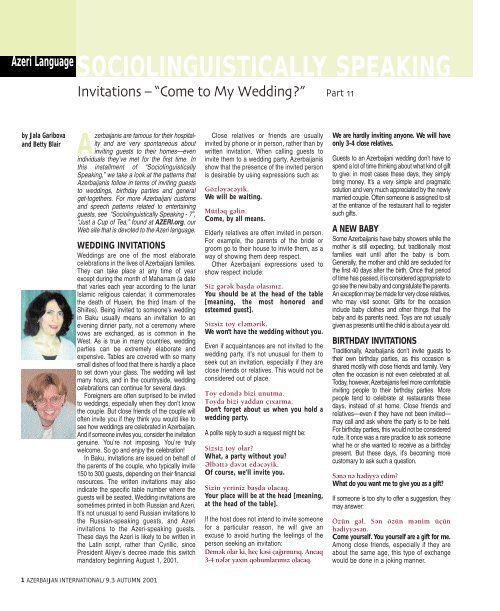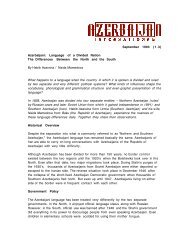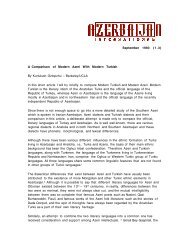Come to My Wedding?" - Part 11 - Azerbaijan International Magazine
Come to My Wedding?" - Part 11 - Azerbaijan International Magazine
Come to My Wedding?" - Part 11 - Azerbaijan International Magazine
You also want an ePaper? Increase the reach of your titles
YUMPU automatically turns print PDFs into web optimized ePapers that Google loves.
Azeri Language SOCIOLINGUISTICALLY SPEAKING<br />
by Jala Garibova<br />
and Betty Blair<br />
Invitations – “<strong>Come</strong> <strong>to</strong> <strong>My</strong> <strong>Wedding</strong>?” <strong>Part</strong> <br />
A zerbaijanis<br />
are famous for their hospitality<br />
and are very spontaneous about<br />
inviting guests <strong>to</strong> their homes—even<br />
individuals they’ve met for the first time. In<br />
this installment of “Sociolinguistically<br />
Speaking,” we take a look at the patterns that<br />
<strong>Azerbaijan</strong>is follow in terms of inviting guests<br />
<strong>to</strong> weddings, birthday parties and general<br />
get-<strong>to</strong>gethers. For more <strong>Azerbaijan</strong>i cus<strong>to</strong>ms<br />
and speech patterns related <strong>to</strong> entertaining<br />
guests, see “Sociolinguistically Speaking - 7”,<br />
“Just a Cup of Tea,” found at AZERI.org, our<br />
Web site that is devoted <strong>to</strong> the Azeri language.<br />
WEDDING INVITATIONS<br />
<strong>Wedding</strong>s are one of the most elaborate<br />
celebrations in the lives of <strong>Azerbaijan</strong>i families.<br />
They can take place at any time of year<br />
except during the month of Maharram (a date<br />
that varies each year according <strong>to</strong> the lunar<br />
Islamic religious calendar, it commemorates<br />
the death of Husein, the third Imam of the<br />
Shiites). Being invited <strong>to</strong> someone’s wedding<br />
in Baku usually means an invitation <strong>to</strong> an<br />
evening dinner party, not a ceremony where<br />
vows are exchanged, as is common in the<br />
West. As is true in many countries, wedding<br />
parties can be extremely elaborate and<br />
expensive. Tables are covered with so many<br />
small dishes of food that there is hardly a place<br />
<strong>to</strong> set down your glass. The wedding will last<br />
many hours, and in the countryside, wedding<br />
celebrations can continue for several days.<br />
Foreigners are often surprised <strong>to</strong> be invited<br />
<strong>to</strong> weddings, especially when they don’t know<br />
the couple. But close friends of the couple will<br />
often invite you if they think you would like <strong>to</strong><br />
see how weddings are celebrated in <strong>Azerbaijan</strong>.<br />
And if someone invites you, consider the invitation<br />
genuine. You’re not imposing. You’re truly<br />
welcome. So go and enjoy the celebration!<br />
In Baku, invitations are issued on behalf of<br />
the parents of the couple, who typically invite<br />
150 <strong>to</strong> 300 guests, depending on their financial<br />
resources. The written invitations may also<br />
indicate the specific table number where the<br />
guests will be seated. <strong>Wedding</strong> invitations are<br />
sometimes printed in both Russian and Azeri.<br />
It’s not unusual <strong>to</strong> send Russian invitations <strong>to</strong><br />
the Russian-speaking guests, and Azeri<br />
invitations <strong>to</strong> the Azeri-speaking guests.<br />
These days the Azeri is likely <strong>to</strong> be written in<br />
the Latin script, rather than Cyrillic, since<br />
President Aliyev’s decree made this switch<br />
manda<strong>to</strong>ry beginning August 1, 2001.<br />
1 AZERBAIJAN INTERNATIONAL/9.3 AUTUMN 2001<br />
Close relatives or friends are usually<br />
invited by phone or in person, rather than by<br />
written invitation. When calling guests <strong>to</strong><br />
invite them <strong>to</strong> a wedding party, <strong>Azerbaijan</strong>is<br />
show that the presence of the invited person<br />
is desirable by using expressions such as:<br />
G=zlwywcwyik.<br />
We will be waiting.<br />
M^tlwq gwlin.<br />
<strong>Come</strong>, by all means.<br />
Elderly relatives are often invited in person.<br />
For example, the parents of the bride or<br />
groom go <strong>to</strong> their house <strong>to</strong> invite them, as a<br />
way of showing them deep respect.<br />
Other <strong>Azerbaijan</strong>i expressions used <strong>to</strong><br />
show respect include:<br />
Siz gwrwk ba]da olas\n\z.<br />
You should be at the head of the table<br />
[meaning, the most honored and<br />
esteemed guest].<br />
Sizsiz <strong>to</strong>y elwmwrik.<br />
We won’t have the wedding without you.<br />
Even if acquaintances are not invited <strong>to</strong> the<br />
wedding party, it’s not unusual for them <strong>to</strong><br />
seek out an invitation, especially if they are<br />
close friends or relatives. This would not be<br />
considered out of place.<br />
Toy edwndw bizi unutma.<br />
Toyda bizi yaddan [\xarma.<br />
Don’t forget about us when you hold a<br />
wedding party.<br />
A polite reply <strong>to</strong> such a request might be:<br />
Sizsiz <strong>to</strong>y olar?<br />
What, a party without you?<br />
Wlbwttw dwvwt edwcwyik.<br />
Of course, we’ll invite you.<br />
Sizin yeriniz ba]da olacaq.<br />
Your place will be at the head [meaning,<br />
at the head of the table].<br />
If the host does not intend <strong>to</strong> invite someone<br />
for a particular reason, he will give an<br />
excuse <strong>to</strong> avoid hurting the feelings of the<br />
person seeking an invitation:<br />
Demwk olar ki, he[ kwsi [a`\rm\r\q. Ancaq<br />
3-4 nwfwr yax\n qohumlar\m\z olacaq.<br />
We are hardly inviting anyone. We will have<br />
only 3-4 close relatives.<br />
Guests <strong>to</strong> an <strong>Azerbaijan</strong>i wedding don’t have <strong>to</strong><br />
spend a lot of time thinking about what kind of gift<br />
<strong>to</strong> give: in most cases these days, they simply<br />
bring money. It’s a very simple and pragmatic<br />
solution and very much appreciated by the newly<br />
married couple. Often someone is assigned <strong>to</strong> sit<br />
at the entrance of the restaurant hall <strong>to</strong> register<br />
such gifts.<br />
A NEW BABY<br />
Some <strong>Azerbaijan</strong>is have baby showers while the<br />
mother is still expecting, but traditionally most<br />
families wait until after the baby is born.<br />
Generally, the mother and child are secluded for<br />
the first 40 days after the birth. Once that period<br />
of time has passed, it is considered appropriate <strong>to</strong><br />
go see the new baby and congratulate the parents.<br />
An exception may be made for very close relatives,<br />
who may visit sooner. Gifts for the occasion<br />
include baby clothes and other things that the<br />
baby and its parents need. Toys are not usually<br />
given as presents until the child is about a year old.<br />
BIRTHDAY INVITATIONS<br />
Traditionally, <strong>Azerbaijan</strong>is don’t invite guests <strong>to</strong><br />
their own birthday parties, as this occasion is<br />
shared mostly with close friends and family. Very<br />
often the occasion is not even celebrated at all.<br />
Today, however, <strong>Azerbaijan</strong>is feel more comfortable<br />
inviting people <strong>to</strong> their birthday parties. More<br />
people tend <strong>to</strong> celebrate at restaurants these<br />
days, instead of at home. Close friends and<br />
relatives—even if they have not been invited—<br />
may call and ask where the party is <strong>to</strong> be held.<br />
For birthday parties, this would not be considered<br />
rude. It once was a rare practice <strong>to</strong> ask someone<br />
what he or she wanted <strong>to</strong> receive as a birthday<br />
present. But these days, it’s becoming more<br />
cus<strong>to</strong>mary <strong>to</strong> ask such a question.<br />
Swnw nw hwdiyyw edim?<br />
What do you want me <strong>to</strong> give you as a gift?<br />
If someone is <strong>to</strong>o shy <strong>to</strong> offer a suggestion, they<br />
may answer:<br />
+z^n gwl. Swn =z^n mwnim ^[^n<br />
hwdiyywswn.<br />
<strong>Come</strong> yourself. You yourself are a gift for me.<br />
Among close friends, especially if they are<br />
about the same age, this type of exchange<br />
would be done in a joking manner.
INVITING SOMEONE OVER<br />
<strong>Azerbaijan</strong>is invite friends and relatives <strong>to</strong><br />
their homes with phrases like:<br />
Bizw gwl.<br />
<strong>Come</strong> <strong>to</strong> our place.<br />
Niyw bizw gwlmirswn?<br />
Why don’t you come <strong>to</strong> our place?<br />
{oxdand\r bizw gwlmirswn.<br />
You haven’t been <strong>to</strong> our place for a long<br />
time.<br />
These expressions imply “come at any<br />
time,” rather than restricting the guest <strong>to</strong> a<br />
certain day and hour. This is a more general<br />
type of invitation and definitely doesn’t<br />
mean that the host is not being sincere. If<br />
<strong>Azerbaijan</strong>is invite someone <strong>to</strong> visit, they<br />
think that any time is a good time.<br />
Deep down, perhaps <strong>Azerbaijan</strong>is feel <strong>to</strong>o<br />
shy <strong>to</strong> say, “<strong>Come</strong> at such-and-such a time”<br />
because they are afraid that their invitation<br />
will be interpreted as, “We don’t have time<br />
for you other than at this hour of this day.”<br />
However, as people are getting busier<br />
and busier, invitations are sometimes followed<br />
by a request for a phone call beforehand:<br />
Nw vaxt istwyirswn gwl. Amma gwlmwzdwn<br />
wvvwl zwng et. Birdwn evdwn [\xm\]<br />
olaram.<br />
<strong>Come</strong> at any time. Just make a call<br />
before coming, in case I have left home.<br />
Foreigners tend <strong>to</strong> respond differently <strong>to</strong><br />
invitations than <strong>Azerbaijan</strong>is do. An<br />
<strong>Azerbaijan</strong>i would usually say:<br />
Yax]\, gwlwrwm.<br />
OK, I will come.<br />
Zwng edib gwlwrwm.<br />
I will call and come.<br />
But a foreigner tends <strong>to</strong> ask: “OK, when?”<br />
expecting that the person inviting him has<br />
a specific date and time in mind.<br />
Guests typically bring gifts like a box of<br />
chocolates or a bouquet of flowers (make<br />
sure it’s an odd number of blossoms, as an<br />
even number is associated with death). If<br />
there is a man in the house, the men might<br />
choose <strong>to</strong> bring a bottle of champagne. On<br />
the occasion of Novruz, guests usually<br />
prepare and bring “khonchas”, special<br />
baked sweets.<br />
AZER.COM<br />
When expressing their appreciation, the<br />
guests don’t usually follow the Western<br />
practice of sending thank-you notes after<br />
their visit. Instead, they will invite the hosts<br />
over <strong>to</strong> their own houses on a similar occasion.<br />
DECLINING AN INVITATION<br />
Once <strong>Azerbaijan</strong>is receive an invitation, they<br />
will make every effort <strong>to</strong> attend the event. An<br />
<strong>Azerbaijan</strong>i proverb says:<br />
{a`\r\lan yerw ar elwmw, [a`\r\lmayan<br />
yeri dar elwmw.<br />
Don’t be shy <strong>to</strong> go a place where you have<br />
been invited, and don’t narrow the place<br />
where you haven’t been invited.<br />
The second part of this proverb means:<br />
“Don’t impose yourself or make the hosts<br />
feel uncomfortable.”<br />
If someone is reluctant <strong>to</strong> go or doesn’t<br />
want <strong>to</strong> stay very long, he or she will at least<br />
show up for a few minutes. Or, they might<br />
send a family member instead. For example,<br />
if someone is unable <strong>to</strong> attend the wedding<br />
party of a relative, he might ask his son or<br />
daughter <strong>to</strong> go instead of him.<br />
When declining an invitation, <strong>Azerbaijan</strong>is<br />
will try <strong>to</strong> give a solid reason for the refusal,<br />
even if they have <strong>to</strong> make up an excuse:<br />
Daha wvvwl ba]qa bir mwclisw [a`\r\blar.<br />
Ora getmwyw s=z vermi]wm.<br />
I have a prior invitation and I have<br />
already promised <strong>to</strong> go there.<br />
I]w [a`\r\blar. Getmwswm olmaz.<br />
I’ve been called <strong>to</strong> work. I have <strong>to</strong> go.<br />
<strong>Azerbaijan</strong>is won’t usually refuse an invitation<br />
right away, even if they know for certain<br />
that they won’t attend:<br />
{al\]aram gwlim.<br />
I will try <strong>to</strong> come.<br />
Then they may apologize later:<br />
Ba`\]lay\n, vacib bir i] [\xd\. Ona g=rw<br />
dw gwlw bilmwdim.<br />
I’m sorry. An unexpected problem came<br />
up, and I couldn’t come.<br />
If someone has missed an event, such as a<br />
wedding party or a birthday party, he will<br />
show up on a later date, usually with a gift,<br />
<strong>to</strong> congratulate the host. In the case of a<br />
wedding, the gift should not be money, but<br />
rather something that the couple might<br />
need for their new home, like a tablecloth, a<br />
set of cutlery or drinking glasses.<br />
These days weddings are recorded on video, just like they are<br />
elsewhere in the world. At “Venice” down off the Boulevard at<br />
the seafront in Baku. Pho<strong>to</strong>: Elman Gurbanov.<br />
<strong>Azerbaijan</strong>is are known for their gracious<br />
hospitality, their politeness and warmth.<br />
They delight in making relationships with<br />
foreigners and in entertaining one another.<br />
They try their best <strong>to</strong> make these occasions<br />
unforgettable experiences for everyone.<br />
Jala Garibova has a doc<strong>to</strong>rate in linguistics<br />
and teaches at Western University in Baku.<br />
Betty Blair is the Edi<strong>to</strong>r of <strong>Azerbaijan</strong><br />
<strong>International</strong>. The entire series of<br />
“Sociolinguistically Speaking” may be<br />
accessed at AZERI.org. ■<br />
9.3 AUTUMN 2001/AZERBAIJAN INTERNATIONAL 2














